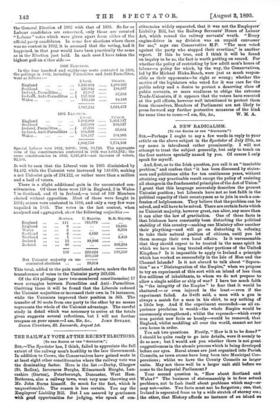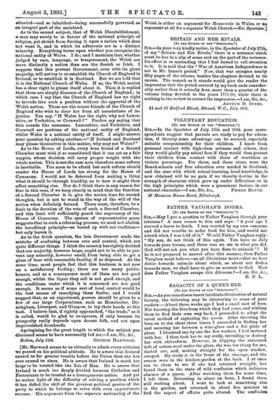A NEW RADICALISM.
[To THE EDITOR OF THE "SFECTATOR."1
SIR,—Perhaps I ought to say a few words in reply to your article on the above subject in the Spectator of July 27th, as my name is introduced rather prominently. I will not attempt to treat the subject generally, but only to touch on the four matters specially named by you. Of course I only speak for myself.
And, first, as to the Irish question, you call it an "insoluble problem," and confess that "it has been discussed by states- men and politicians alike for ten continuous years, without attaining any practicable result except the policy of resisting all changes in the fundamental principles of the Act of Union." I grant that this language accurately describes the present Unionist position; but Liberals have not so lost faith in the political capacity of their countrymen as to join in such a con- fession of helplessness. They believe that the problem can be solved, and will have to be solved. There are certain facts which no Unionist majority, however great, can alter, any more than it can alter the law of gravitation. One of these facts is that Irishmen have constantly been disturbing the political stability of this country—making one Ministry after another their plaything—and will go on disturbing it, refusing to take their natural position of citizens, until you let them manage their own local affairs. Is it unreasonable. that they should expect to be treated in the same spirit in which we have so long treated other portions of the United Kingdom ? Is it impossible to apply to Ireland a principle which has worked so successfully in the Isle of Man and the Channel Islands? Is it not absurd to talk about " Separa- tion " as a "Disintegration of the Empire," when we propose to try an experiment of this sort with an island of less than. five millions of inhabitants, to whom we do not propose to allow a single soldier or ship of war? I have too much faith in "the integrity of the Empire" to fear that it would be shattered — or even injured in the least — even if the experiment failed. As Swift said, a man with a gun is always a match for a man in his shirt, to say nothing of a little boy. And if the experiment succeeded—as all ex- perience proclaims it would—the whole Empire would be- enormously strengthened ; whilst the reproach—which every true patriot now feels so keenly—would be removed, that England, whilst meddling all over the world, cannot set her- own house in order.
You ask two questions. Firstly, "How is it to be done?"' I should be quite ready to go into details, were it seemly to do so now; but I would ask you whether there is not great suggestiveness in the atomic process which is being developed before our eyes. Rural atoms are just organised into Parish Councils, as town atoms have long been into Municipal Cor- porations; whilst we have the County Councils as larger units. May not there well be a larger unit still before we come to the Imperial Parliament ?
Your second question is, "How about Scotland and Wales?" The business of statesmanship is to face actual problercs, not to :task itself about problems which may—or may not—arise. Two facts must not be forgotten; one, that Ireland is separated from us by a wide stretch of stormy sea ; the other, that History affords no instance of an island so situated—and so inhabited—being successfully governed as an integral part of the mainland.
As to the second subject, that of Welsh Disestablishment, a man may surely be in favour of the national principle of religion, yet shrink from forcing it upon a nation which does cot want it, and in which its adherents are in a distinct minority. Everything turns upon whether you recognise the tkational entity of Wales. I do; and I maintain that, whether judged by race, language, or temperament, the Welsh are more distinctly a nation than are the Scotch or Irish. I suppose that this present Government, even with its giant majority, will not try to re-establish the Church of England in Ireland, or to establish it in Scotland. But we are told that -it is the National Church of Wales. If so, the Welsh nation has a clear right to please itself about it. Then it is replied that these are simply dioceses of the Church of England ; in which case I say that the Church of England has no right -to intrude into such a position without the approval of the 'Welsh nation. Those are the truest friends of the Church of England who wish to clear her from all associations of in- justice. You say, "If Wales has the right, why not Lanca- shire, or Yorkshire, or Cornwall P " Pardon my saying that this sounds like nonsense. Lancashire, and Yorkshire, and Cornwall are portions of the national entity of England, whilst Wales is a national entity of itself. I might answer your question by asking another,—" If Ireland and Scotland ,may please themselves in this matter, why may not Wales F" As to the House of Lords, every true friend of a Second Chamber must wish it so constituted that it can act as a fair umpire, whose decision will carry proper weight with the whole nation. This is not the case now, therefore some reform us inevitable. You seem to be afraid lest such reform should render the House of Lords too strong for the House of -Commons. I would not be deterred from making a thing what it should be through timidity, as to how it might then -affect something else. Nor do I think there is any reason for -fear in this case, if we keep clearly in mind that the function of a Second Chamber is to give the nation time for second thoughts, but is not to stand in the way of the will of the nation when definitely formed. There must, therefore, be a limit to the duration of the veto of such a Second Chamber, and this limit will sufficiently guard the supremacy of the House of Commons. The system of representative peers suggests that in such a reforming process, we need not abolish the hereditary principle—so bound up with our tradition—
"but only leaven it. .
As to the drink question, the late Government made the mistake of confusing between veto and control, which are quite different things. I think the country has rightly decided that our majority, however large, ought not to be able to pre- vent any minority, however small, from being able to get a glass of beer with reasonable facility, if so disposed. At the same time, most people feel that this business is not now on a satisfactory footing ; there are too many public- '
houses, and as a consequence most of them are not good enough, whilst the liquor they sell is not good enough, and the conditions under which it is consumed are not good enough. It seems as if some sort of local control would be the best means of remedying these faults; and I would suggest that, as an experiment, powers should be given to a few of our large Corporations, such as Manchester, Bir- mingham, Liverpool, and Glasgow, to try their hands at this task. I believe that, if rightly approached, "the trade," as it is called, would be glad to co-operate, if only because its prosperity really depends upon decent folk, and not upon impoverished drunkards.
Apologising for the great length to which the subject you discussed seems to have necessarily led me,—I am, Sir, &c, [Mr. Harwood seems to us virtually to admit every criticism we passed on his political attitude. He is aware that Ireland caused us far greater trouble before the Union than she has ever caused us since. He is aware that Ireland is much too large to be treated like the Isle of Man. He is aware that Ireland is much too deeply divided between Catholics and Protestants to be treated as a homogeneous nation. And yet he makes light of the difficulty of solving a problem which it has defied the skill of the greatest political genius of the party to which he belongs to solve with even approximate 'success. His argument from the separate nationality of the Welsh is either an argument for Home-rule in Wales, or no argument at all for a separate Welsh Church.—En. Spectator.]



































 Previous page
Previous page